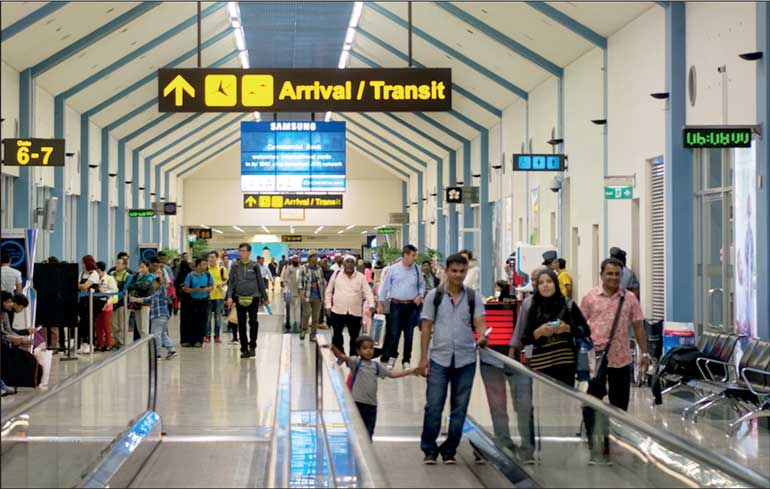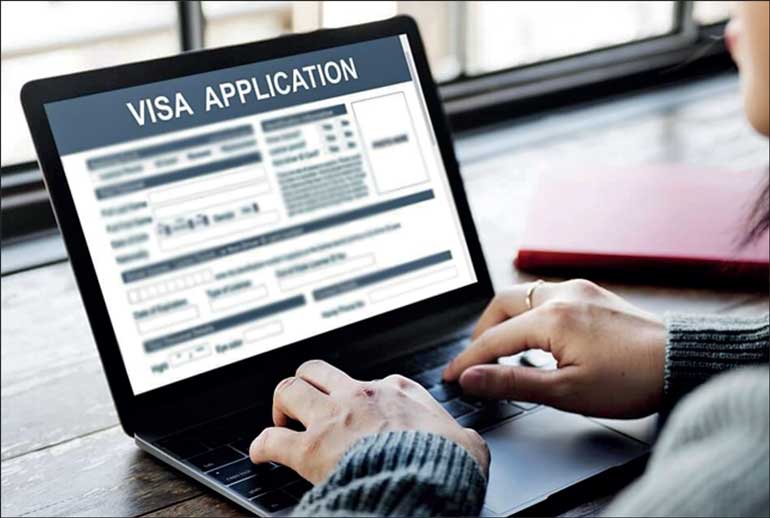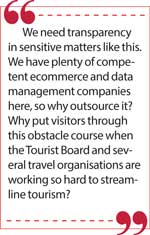Saturday Feb 21, 2026
Saturday Feb 21, 2026
Wednesday, 3 July 2024 00:20 - - {{hitsCtrl.values.hits}}


An obstacle course that spanned three continents just to process something as simple as ordering dinner from UberEats
 I was born in Sri Lanka, live in the US, and visit my home country often. The very idea of having to get a visa to a country I lived in for a greater part of my life is discomforting. Nevertheless, in order to comply, three weeks before I travelled, I went through the process. No different from thousands of others. However this time, it turned out to be a bizarre obstacle course set up by an Indian outfit masked behind a bunch of acronyms.
I was born in Sri Lanka, live in the US, and visit my home country often. The very idea of having to get a visa to a country I lived in for a greater part of my life is discomforting. Nevertheless, in order to comply, three weeks before I travelled, I went through the process. No different from thousands of others. However this time, it turned out to be a bizarre obstacle course set up by an Indian outfit masked behind a bunch of acronyms.
First hurdle: IVS-GBS and VFS Global
First hurdle, IVS-GBS and VFS Global. They laid the hurdles on the track. The portal seemed designed to grab data from the information page of the passport, populate the portal with pertinent information and raise one’s blood pressure without the help of pharmaceuticals. My first attempt to apply for the visa generated an error message without telling me what piece of data was unacceptable. I proceeded to type in my passport information instead, assuming a pesky syntax error had crept in. No luck. The page on the portal did not let me move forward, an indication that there was some other error – an invisible hurdle I was running up against. There was none.
I then called the Sri Lankan embassy in Washington DC, and spoke to the visa officer who politely told me that “we don’t know anything about this, etc.” But the nice man referred me to the Indian company via a link that was supposed to be on the eVisa page. “An Indian company?” I asked, feigning surprise. (Social media had been teeming with angry vibes about this for weeks.) He asked me to look for a link on the page for this mystery Indian company issuing Sri Lankan visas, that the visa officer didn’t have much knowledge of.
The eVisa website is so well designed that you could hide the code to the nuclear weapons of a country on that page and no one would find it. After much Googling, and employing my low-key secret weapon, ‘Control-F,’ I found it. (No, not the nuclear code, the Indian helpline.) The link enabled me to have a text chat with someone with an Indian name. Meanwhile, I also emailed them by guessing the email address from the domain, and after two days received an email response. It was signed by someone called Vinoth. When you get an email with an address that says “Sri Lanka in Saudi Arabia [email protected]” it makes you wonder if you accidentally tried to apply to the wrong country. Perhaps this Vinoth guy was a human, not a chatbot; not in Riyadh or Mumbai, but in an airconditioned office in Battaramulla watching the T20s when not watching his screen.
So let’s refresh before we get to the next hurdle: I was applying for a visa to Sri Lanka, was asked to contact an Indian company for help, and received a response from a server suggesting it’s in Saudi. A foreign national not familiar with this kind of everyday discombobulation, would give up on paradise and settle for spelunking in Fiji.
By now I was on a roll, and did as my man Vinoth said, cleared my cookies, used a different computer, and a different web browser and tried again. If he had asked me to wipe my computer with Lysol, install Linux, and have a samosa, I would have obliged. I tried for the third time. Still the portal would not take me forward. I gave up and decided to try the next day. Of course, the next day the result was the same. I called the Sri Lankan embassy and whined to them. They asked me to give it a few days so they would ‘look into it.’ (Perhaps a euphemism for “We will WhatsApp a dude in Colombo and see if they know the politician who’s making a cut on this.”)
The clock was now ticking, so I called my travel agent. As the private sector always does, this guy had a solution. He had an employee who handled this sort of thing, for a small fee. Sure I said seeing a light at the end of a tunnel that seemed to stretch from Colombo to Saudi. His guy, let’s call him Marlon, asked me to send him a copy of my passport information page, and my passport photo. We were on the phone when he logged in. Marlon knew to clear hurdles. For a moment at least.
Next hurdle
 Next hurdle: He too ran into an error message. He thought my passport photo needed a flat white background instead of grey. I went over to Photoshop and cleaned that out and sent it back. After a few tries, Marlon breathed a huge sigh. I began to smile again–prematurely. He said the next step was to enter the credit card information, which I gave him. Miraculously, the payment went through, and Marlon and I digitally high-fived each other. He said I would receive a confirmation to my email address, so I could get off the phone. I waited a few minutes just to be sure. No email. I decided to call it a day and go to bed. It was midnight. I had to get to work by 6:30 the next day.
Next hurdle: He too ran into an error message. He thought my passport photo needed a flat white background instead of grey. I went over to Photoshop and cleaned that out and sent it back. After a few tries, Marlon breathed a huge sigh. I began to smile again–prematurely. He said the next step was to enter the credit card information, which I gave him. Miraculously, the payment went through, and Marlon and I digitally high-fived each other. He said I would receive a confirmation to my email address, so I could get off the phone. I waited a few minutes just to be sure. No email. I decided to call it a day and go to bed. It was midnight. I had to get to work by 6:30 the next day.
And then, at midnight, Marlon called back.
Next hurdle: Credit card denied
The next hurdle: “Your credit card was denied,” he said, gingerly. This was a credit card I used almost every day, so there should not have been a credit issue. I called the credit card’s helpline and asked for someone who could tell me why. From the clicks, dead air, and the ums, I knew something was up. They transferred me to the fraud bureau. The person who took the call told me that the payment had been denied because they had smelled a rat. Why? I lived in one state in the US, my card information was being entered (by my travel agent) in a different state, for a visa for Sri Lanka, through a website in Mumbai (for what they could tell), and being processed in the Middle East. It screamed ID theft or fraud. I don’t blame them. I told them that it was fine, that this was not a fraud (a legal scam, perhaps that we politely call hurdles), and that they could approve it.
I called Marlon back, and the visa was finally, finally, approved. It had taken me four days, about four and a half hours. An obstacle course that spanned three continents just to process something as simple as ordering dinner from UberEats.
I don’t know the politics of what’s behind this murky business of issuing a simple visa, but I do know this. The company handling this, supposedly for many European countries, has a processing portal that an A-level student in Gateway College could design and program in a weekend. Without a samosa.
The big picture
Here’s the big picture: You and I don’t need a degree in computer science to know when something is so jinxed, and looks like a cybersecurity threat. Our data could be easily harvested and compromised as it passes through several continents and servers. The eVisa portal managed by VFS Global is ripe for exploiting citizens and governments. Four years ago the Independent newspaper revealed this shenanigan in the UK.1 The true owner of the VFS domain, gbstechnologyservices.com, is masked in the WHOIS domain search registry (not illegal, but raises a red flag). Their servers could be housed in Tirunelveli, Trincomalee, or Timbuktu, and we would not know. We need transparency in sensitive matters like this. We have plenty of competent ecommerce and data management companies here, so why outsource it? Why put visitors through this obstacle course when the Tourist Board and several travel organisations are working so hard to streamline tourism?
Footnote:
1https://www.independent.co.uk/news/uk/home-news/home-office-vfs-visas-profit-subcontracted-contract-outsourcing-premium-services-exploited-a9056446.html
(The writer is based in the USA and applied for his visa in May this year.)